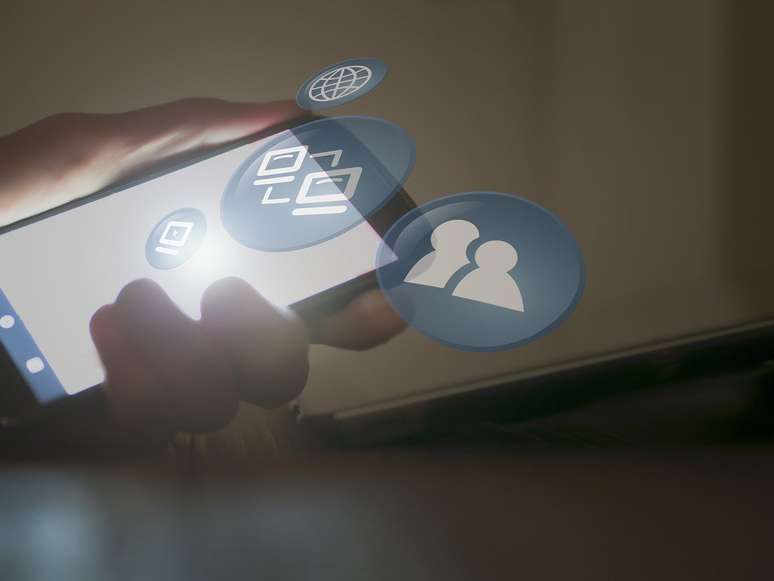Interest in the lives of others on social media is tempting, but this obsession is illusory and can lead to serious self-esteem issues. Today, with the Internet, we have everything we want in the palm of our hands. With just one click, or a “swipe up”, we have access to products, information, news and, perhaps, to the point […]
Interest in the lives of others on social media is tempting, but this obsession is illusory and can lead to serious self-esteem issues.
Nowadays, with the Internet, we have everything we want in the palm of our hands. With just one click, or a “swipe up”, we have access to products, information, news and, perhaps, the most tempting point: the routines of others. Of course, on the one hand, social media brings us closer to each other. And being updated on what family or loved ones are doing is even fun or just plain satisfying.
But what happens when this curiosity about the lives of others begins to dictate how we see the world and ourselves? After all, the Internet has become an environment conducive to selling unrealistic standards, be they physical, financial or behavioral, and this is very dangerous.
Everyone has space on the Internet
The vast majority of people we live with are online on social media, whether for work or personal use, as a form of entertainment. Tatiane Paula, a psychologist specializing in relationships, compulsions, anxiety and mental disorders, explains that digital exposure can have direct consequences on mental health. For the simple fact that, on the internet, many people feel free to express their opinion on whatever they want. “They consider themselves to have the right to comment, swear and talk about any aspect of another person’s life, or body, without worrying about what this might do to the mental health of the person reading this.”
Furthermore, according to the professional, those who write these messages believe they are sincere and correct in saying what they think. Although this represents a certain cowardice, since they hide behind profiles, often fake, created only to harass and attack another person. “They take advantage of the convenience offered by social networks, i.e. the distance. After all, would these people have the courage to say everything they type on social networks to someone’s face?”, he asks.
Who enforces these standards on the Internet?
Like all media of the time, today it is online platforms that define and spread standards of beauty and life that should be followed by everyone. It is a fact that these standards have always existed. The difference, according to the psychologist, is that “before, to access it, you had to buy a magazine or watch television, whereas now it’s all in the palm of your hands, through your mobile phone”.
Also in terms of comparison, we can observe the change in who serves as role models for these beauty standards, which were previously set by models or actresses appearing in mainstream media. “Currently it is influencers who play this role, and they don’t even need to be known nationally. The perfect life and body that many influencers achieve become a desire for those who follow and consume that content”, underlines the expert.
“Those who consume this content will always compare themselves and think that what they have in their life is not good enough, that they are not trying hard enough. This affects self-esteem, as the person places the influencer’s life as a goal to achieve achieved.”
Tatiana also points out that this doesn’t just happen to those who follow these influencers. “This comparison and impact on self-esteem also occurs when acquaintances post their successes on social media. Because some people feel guilty for not being on the same level.”
“Those who watch, ignore what is offline and believe that what is posted is the absolute truth about the other person’s reality. They use this ruler as a measure between success and failure.”
I need to be accepted! (Will it be?)
According to clinical psychologist Fernanda C. Alexandre, much of this obsession with unrealistic life and body models comes from the demand to be socially accepted, whether it is an internal demand or the world’s. This search for “matching the ideal” generates a wave of comparisons that leaves people increasingly confused. “Social acceptance is a basic human need and explicit judgments can trigger anxiety, impacting self-esteem. Reality distortion on social media is an area of psychological concern.”
The professional states that psychological support is fundamental when this dynamic enhances the false idea of belonging. “Addressing social comparison is key to mitigating feelings of inadequacy. Cognitive behavioral therapy can be applied to explore cognitive distortions, challenge negative automatic thoughts, and promote a more balanced outlook on life,” says Fernanda.
For those who live like this: therapy!
Staying away from social media is not a viable option for everyone. Especially since many people nowadays work on the Internet as their main source of income. So how to manage this whole situation so as not to get sick in the digital environment? Fernanda says professional support is the best solution. “Dealing with stress online, especially for those who have no choice but to work in this environment, requires a more structured psychotherapeutic approach in cognitive behavioral therapy. This may include developing emotional regulation skills, establishing clear boundaries between work life and personal and the creation of solid emotional support.”
Not everything is bad
To lighten this discussion, we must also remember that, despite all these negative aspects, social networks can also help, as they are an open space where professionals in the sector can share information. Tatiane Paula admits that, thanks to the Internet, the topic of “mental health” is much more popular, as both content and professionals are more accessible. “Before, to have access to psychologists and psychiatrists, it was necessary to arrange an in-person consultation, there were travel costs, traffic costs and a small number of professionals. However, with the pandemic, online services have become increasingly widespread and have begun to be part of people’s lives, allowing them to take care of their mental health from the comfort of home”, concludes the psychologist.
Source: Terra
Rose James is a Gossipify movie and series reviewer known for her in-depth analysis and unique perspective on the latest releases. With a background in film studies, she provides engaging and informative reviews, and keeps readers up to date with industry trends and emerging talents.








